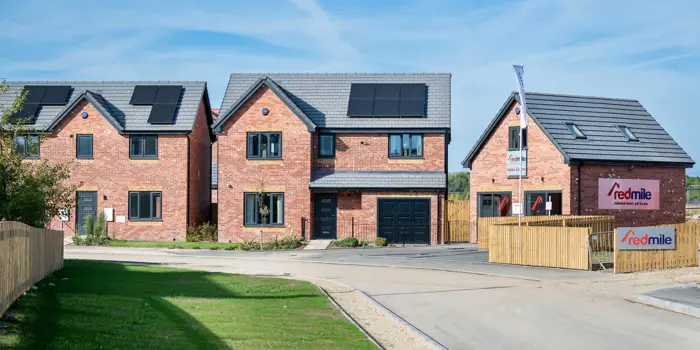
Our Complete Mortgage Guide
Understanding mortgages before you buy
Before reserving a plot or beginning the home-buying process, it’s important to understand how you’ll pay for your new home and what you can realistically afford.

Know how you plan to pay
When it comes to buying a home, most people use a mortgage. This is a loan from a lender that helps you buy a property. The alternative is paying the full amount upfront using savings or money that’s been gifted to you (in this case, you would be a “cash buyer”).
If you’re taking out a mortgage, you’ll need a deposit. This is the amount you pay upfront towards the cost of the property. Most lenders require at least 5% of the purchase price, although a larger deposit can unlock better mortgage rates and lower monthly repayments.

Work out what you can afford
When deciding how much to lend, mortgage providers will look at your overall financial position. This includes:
- Your income (and your partner’s, if applying jointly)
- Your regular spending and existing financial commitments
- Any debts or loans
- Your credit history and score
The aim is to check you can comfortably manage monthly repayments. Even if you’ve saved a good deposit, lenders need to be confident you can afford the mortgage long-term.
Tip: If you want to estimate affordability yourself, you can use online calculators to get a rough idea of your budget. They’ll show how factors like deposit size, mortgage term, and interest rate affect what you could borrow and what monthly payments might look like.
Get a mortgage in principle
A Mortgage in Principle (MIP) – also called an Agreement in Principle (AIP) or Decision in Principle (DIP) – is a statement from a mortgage lender confirming how much they’re likely to lend you based on your financial details.
It’s not a formal offer, but it shows sellers and developers you’re a serious buyer, which can speed up the process when you find the right home or plot. It also gives you a clear idea of your maximum budget before you start making decisions about which property to reserve.
Use the help of a mortgage broker
A mortgage broker (or mortgage advisor) is a qualified professional who helps you find and apply for the right mortgage. Instead of comparing deals yourself, a broker searches the market on your behalf and handles much of the application process for you.

Working with a broker can save both time and money. They can:
- Help you understand what’s realistic for your income and deposit
- Arrange your initial Mortgage in Principle (MIP)
- Access mortgage deals not always available directly to buyers
- Complete your full mortgage application with the lender
- Handle paperwork and communications with lenders
- Advise on or arrange related insurance products if needed
Some brokers charge a fee for their service, while others are completely free to use. Fee-free brokers are usually paid a commission by the lender or insurer, so you still receive professional, independent advice but without charge.
Note: Using a mortgage broker is optional. You can arrange a Mortgage in Principle or apply for a mortgage directly if you prefer. However, a broker can give you added peace of mind that you’re getting the right deal and help everything progress more smoothly.
Redmile Homes’ mortgage broker partners
Below are two independent brokers we recommend if you’re interested in buying a property with Redmile Homes. Both are highly experienced with new builds and understand how to work with developers, plot reservations, and mortgage timings.
You’re also welcome to use your own broker. We understand that many buyers already have trusted advisors or personal recommendations. Our suggested brokers are simply here to make things easier if you’d like experienced, reliable support at any stage of the process.

Mortgage Broker: New Homes Advice
New Homes Advice is a specialist in new build mortgages, supporting buyers through the entire process. They have decades of experience arranging mortgages for newly built homes, and they provide access to broker-exclusive deals you might not reach directly.
- Fee-free service
- Your initial conversation will take place over the phone
- Once you reserve a plot, you’ll attend a full mortgage appointment via video (though in-person can be arranged if needed)
- Contact Ellie Powell at elliep@newhomesadvice.co.uk or call 01543 464144
You could bring in New Homes Advice early – before you reserve a plot – to get your mortgage in principle and an understanding of what you can borrow. Or if you already have a mortgage in principle, they can take over and submit your mortgage application once you've reserved the property.

Mortgage Broker: Mortgage Advice Bureau
Mortgage Advice Bureau (MAB) is a large, established broker network with deep experience in new home mortgages. Their “new homes” division specialises in liaising with developers and working with the particular timelines and requirements of new build purchases.
- Fee-free service for new build purchases
- Consultations carried out via phone, Teams/Zoom, or in person at their Rotherham office
- Contact William Mawson at williammawson@mab.org.uk or call 07518 290056
- Contact the MAB office at newhomesinfo@mab.org.uk or call 03300 021230
Just like with New Homes Advice, you can bring Mortgage Advice Bureau in at whatever stage suits you – for your affordability assessment and MIP before reserving, or for the full application after reservation.
How to get a mortgage UK: A complete mortgage guide
If you’re planning to buy a home, understanding how mortgages work is one of the most important steps. Below, we’ve answered some of the most common questions about getting a mortgage in the UK – from how much you can borrow to how long the process takes.

Quick links – jump to a frequently asked question:
- How do mortgages work?
- What do you need to get a mortgage?
- How do I apply for a mortgage?
- How long does a mortgage application take?
- How long does a mortgage offer last?
- Is the mortgage process different for gifted deposits?
- How much mortgage can I afford?
- Do I need life insurance for a mortgage?
- Do I need building insurance for a mortgage?
- What happens if I miss a payment on my mortgage?
1. How do mortgages work?
A mortgage is a loan used to buy a property. You borrow a set amount from a lender, repay it over an agreed term, and pay interest on the balance. Mortgage terms are usually 25-35 years, though you can choose shorter or longer terms (longer mortgages make the monthly payments smaller, but you’ll pay more interest over time).
You can choose from different mortgage types:
- Repayment mortgage: You repay both the loan and interest each month.
- Interest-only mortgage: You only pay the interest monthly and repay the full loan at the end of the term.
Many people choose a fixed-rate mortgage for the first 2-5 years, meaning your monthly payments stay the same even if interest rates change. When the fixed term ends, you’ll move onto your lender’s standard variable rate (SVR), or you can remortgage (often with help from a broker) to find another good deal.
Some lenders also allow overpayments, letting you pay off your mortgage faster and reduce interest. However, most limit how much you can overpay each year.
2. What do you need to get a mortgage?
To get a mortgage, you’ll need to prove you can afford the repayments. Lenders usually ask for:
- Proof of income (whether work or financial support)
- Details of regular spending
- Details of debts or loans
- Recent bank statements
- Proof of ID and address
- Evidence of your deposit
If you’re self-employed, you’ll normally need the same documents as anyone else, plus at least 2 years of certified accounts (ideally prepared by a qualified accountant), as well as SA302 forms or a tax year overview from HMRC for the last 2-3 years.
3. How do I apply for a mortgage?
You can apply for a mortgage directly with a lender or through a broker. Your application will include financial details and documents to prove your income and expenses. The lender will then assess your affordability and credit history before making a formal offer.
Working with a broker simplifies this process – they’ll gather the information, complete your application, and deal with the lender on your behalf.
4. How long does a mortgage application take?
A mortgage application typically takes 2-6 weeks. The exact time depends on the lender, how complex your finances are, and how quickly you provide the necessary documents. Straightforward cases can sometimes be completed faster, while more detailed or specialist applications may take longer.
5. How long does a mortgage offer last?
Most mortgage offers are valid for 3-6 months, depending on the lender. If your purchase is delayed, your broker or lender can often arrange an extension so the offer remains valid until completion.
6. Is the mortgage process different for gifted deposits?
If a family member or friend helps you with your deposit, most lenders will accept this as long as it’s clearly a gift, not a loan. They’ll usually ask for a signed gifted deposit letter confirming the funds don’t need to be repaid and that the giver won’t have a legal claim to the property. Otherwise, the rest of the mortgage process is much the same.
7. How much mortgage can I afford?
The amount you can borrow depends on your income, outgoings, credit score, and deposit size. As a general guide, lenders may offer around 4-5 times your annual income, though this varies.
Online mortgage calculators can give you a rough idea, but a broker will provide a more accurate assessment and help you find lenders best suited to your financial situation.
8. Do I need life insurance for a mortgage?
Life insurance isn’t a legal requirement in the UK, but most lenders and brokers strongly recommend it. If you die during the mortgage term, a suitable life policy can pay off the remaining balance so your family isn’t left with the debt or at risk of losing the home.
9. Do I need building insurance for a mortgage?
Yes. Most lenders require you to have buildings insurance as part of your mortgage agreement.
For new build homes, estates are often managed by a private company, and buildings insurance may already be included in your annual service charge. Your solicitor or management company will confirm exactly what’s covered.
10. What happens if I miss a payment on my mortgage?
If you miss a mortgage payment, your lender will usually contact you to discuss the situation and help you get back on track. Missing payments can affect your credit score and may lead to arrears charges if not resolved. (Most lenders do not start repossession action until you have missed at least 3 payments.)
If you’re struggling financially, contact your lender or broker as soon as possible – they may be able to offer temporary payment arrangements or support options. It’s also worth considering income or illness protection insurance when you move in, so you’re covered if your circumstances change unexpectedly.
Getting mortgage-ready with confidence
Buying a new home is an exciting milestone, and understanding how mortgages work helps make the process smoother from start to finish. Whether you choose to work directly with a lender or through a broker, being prepared with your documents, deposit, and mortgage in principle gives you the best chance of a quick, stress-free approval.

Thinking about buying from Redmile Homes?
Explore our developments and register your interest today.
Request a callback

Value for money and a home to be proud of.